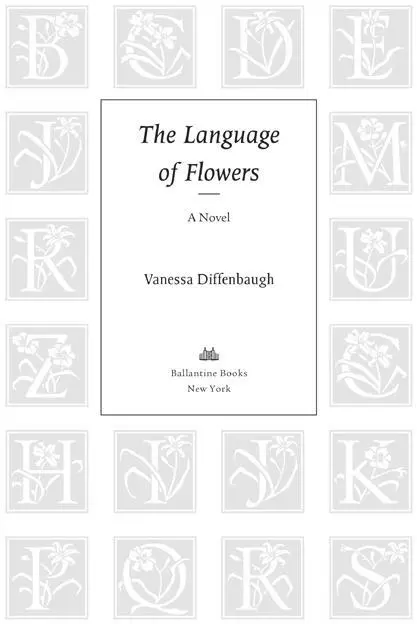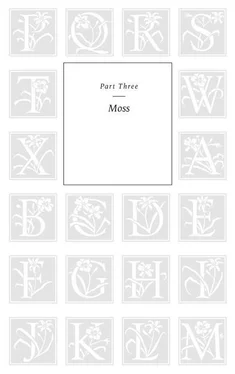Vanessa Diffenbaugh - The Language of Flowers
Здесь есть возможность читать онлайн «Vanessa Diffenbaugh - The Language of Flowers» весь текст электронной книги совершенно бесплатно (целиком полную версию без сокращений). В некоторых случаях можно слушать аудио, скачать через торрент в формате fb2 и присутствует краткое содержание. Жанр: Старинная литература, на английском языке. Описание произведения, (предисловие) а так же отзывы посетителей доступны на портале библиотеки ЛибКат.
- Название:The Language of Flowers
- Автор:
- Жанр:
- Год:неизвестен
- ISBN:нет данных
- Рейтинг книги:4 / 5. Голосов: 1
-
Избранное:Добавить в избранное
- Отзывы:
-
Ваша оценка:
- 80
- 1
- 2
- 3
- 4
- 5
The Language of Flowers: краткое содержание, описание и аннотация
Предлагаем к чтению аннотацию, описание, краткое содержание или предисловие (зависит от того, что написал сам автор книги «The Language of Flowers»). Если вы не нашли необходимую информацию о книге — напишите в комментариях, мы постараемся отыскать её.
The Language of Flowers — читать онлайн бесплатно полную книгу (весь текст) целиком
Ниже представлен текст книги, разбитый по страницам. Система сохранения места последней прочитанной страницы, позволяет с удобством читать онлайн бесплатно книгу «The Language of Flowers», без необходимости каждый раз заново искать на чём Вы остановились. Поставьте закладку, и сможете в любой момент перейти на страницу, на которой закончили чтение.
Интервал:
Закладка:

The Language of Flowers is a work of fiction. Names, characters, places, and incidents are the products of the author’s imagination or are used fictitiously. Any resemblance to actual events, locales, or persons, living or dead, is entirely coincidental.
As of press time, the URLs displayed in this book link or refer to existing websites on the Internet. Random House, Inc., is not responsible for, and should not be deemed to endorse or recommend, any website other than its own or any content available on the Internet (including without limitation at any website, blog page, or information page) that is not created by Random House.
Copyright © 2011 by Vanessa Diffenbaugh
All rights reserved.
Published in the United States by Ballantine, an imprint of The Random House Publishing Group, a division of Random House, Inc., New York.
BALLANTINE and colophon are registered trademarks of Random House, Inc.
LIBRARY OF CONGRESS CATALOGING-IN-PUBLICATION DATA
Diffenbaugh, Vanessa.
The language of flowers: a novel / Vanessa Diffenbaugh.
p. cm.
Summary: “The story of a woman whose gift for flowers helps her change the lives of others even as she struggles to overcome her own past”—Provided by publisher.
eISBN: 978-0-345-52556-7
1. Young women—Fiction. 2. Florists—Fiction. 3. Flower language—Fiction. 4. San Francisco (Calif.)—Fiction. I. Title.
PS3604.I2255L36 2011
813′.6—dc22 2010051026
www.ballantinebooks.com
Jacket design: Anna Bauer
Jacket photograph: Wildcard Images/Glasshouse Images
v3.1
Moss is selected to be the emblem of maternal love, because, like that love, it glads the heart when the winter of adversity overtakes us, and when summer friends have deserted us .—HENRIETTA DUMONT, The Floral Offering
Contents
 Cover Title Page Copyright Epigraph
Cover Title Page Copyright Epigraph
Part One / Common Thistle
Chapter 1
Chapter 2
Chapter 3
Chapter 4
Chapter 5
Chapter 6
Chapter 7
Chapter 8
Chapter 9
Chapter 10
Chapter 11
Chapter 12
Chapter 13
Chapter 14
Part Two / A Heart Unacquainted
Chapter 1
Chapter 2
Chapter 3
Chapter 4
Chapter 5
Chapter 6
Chapter 7
Chapter 8
Chapter 9
Chapter 10
Chapter 11
Chapter 12
Chapter 13
Chapter 14
Chapter 15
Chapter 16
Chapter 17
Chapter 18
Chapter 19
Chapter 20
Chapter 21
Part Three / Moss
Chapter 1
Chapter 2
Chapter 3
Chapter 4
Chapter 5
Chapter 6
Chapter 7
Chapter 8
Chapter 9
Chapter 10
Chapter 11
Chapter 12
Chapter 13
Chapter 14
Chapter 15
Chapter 16
Chapter 17
Part Four / New Beginnings
Chapter 1
Chapter 2
Chapter 3
Chapter 4
Chapter 5
Chapter 6
Chapter 7 Victoria’s Dictionary of Flowers Author’s Note Dedication Acknowledgments About the Author Discussion Questions for The Language of Flowers

1 .
For eight years I dreamed of fire. Trees ignited as I passed them; oceans burned. The sugary smoke settled in my hair as I slept, the scent like a cloud left on my pillow as I rose. Even so, the moment my mattress started to burn, I bolted awake. The sharp, chemical smell was nothing like the hazy syrup of my dreams; the two were as different as Carolina and Indian jasmine, separation and attachment . They could not be confused.
Standing in the middle of the room, I located the source of the fire. A neat row of wooden matches lined the foot of the bed. They ignited, one after the next, a glowing picket fence across the piped edging. Watching them light, I felt a terror unequal to the size of the flickering flames, and for a paralyzing moment I was ten years old again, desperate and hopeful in a way I had never been before and would never be again.
But the bare synthetic mattress did not ignite like the thistle had in late October. It smoldered, and then the fire went out.
It was my eighteenth birthday.
In the living room, a row of fidgeting girls sat on the sagging couch. Their eyes scanned my body and settled on my bare, unburned feet. One girl looked relieved; another disappointed. If I’d been staying another week, I would have remembered each expression. I would have retaliated with rusty nails in the soles of shoes or small pebbles in bowls of chili. Once, I’d held the end of a glowing metal clothes hanger to a sleeping roommate’s shoulder, for an offense less severe than arson.
But in an hour, I’d be gone. The girls knew this, every one.
From the center of the couch, a girl stood up. She looked young—fifteen, sixteen at most—and was pretty in a way I didn’t see much of: good posture, clear skin, new clothes. I didn’t immediately recognize her, but when she crossed the room there was something familiar about the way she walked, arms bent and aggressive. Though she’d just moved in, she was not a stranger; it struck me that I’d lived with her before, in the years after Elizabeth, when I was at my most angry and violent.
Inches from my body, she stopped, her chin jutting into the space between us.
“The fire,” she said evenly, “was from all of us. Happy birthday.”
Behind her, the row of girls on the couch squirmed. A hood was pulled up, a blanket wrapped tighter. Morning light flickered across a line of lowered eyes, and the girls looked suddenly young, trapped. The only ways out of a group home like this one were to run away, age out, or be institutionalized. Level 14 kids weren’t adopted; they rarely, if ever, went home. These girls knew their prospects. In their eyes was nothing but fear: of me, of their housemates, of the life they had earned or been given. I felt an unexpected rush of pity. I was leaving; they had no choice but to stay.
I tried to push my way toward the door, but the girl stepped to the side, blocking my path.
“Move,” I said.
A young woman working the night shift poked her head out of the kitchen. She was probably not yet twenty, and more terrified of me than any of the girls in the room.
“Please,” she said, her voice begging. “This is her last morning. Just let her go.”
I waited, ready, as the girl before me pulled her stomach in, fists clenched tight. But after a moment, she shook her head and turned away. I walked around her.
I had an hour before Meredith would come for me. Opening the front door, I stepped outside. It was a foggy San Francisco morning, the concrete porch cool on my bare feet. I paused, thinking. I’d planned to gather a response for the girls, something biting and hateful, but I felt strangely forgiving. Maybe it was because I was eighteen, because, all at once, it was over for me, that I was able to feel tenderness toward their crime. Before I left, I wanted to say something to combat the fear in their eyes.
Читать дальшеИнтервал:
Закладка:
Похожие книги на «The Language of Flowers»
Представляем Вашему вниманию похожие книги на «The Language of Flowers» списком для выбора. Мы отобрали схожую по названию и смыслу литературу в надежде предоставить читателям больше вариантов отыскать новые, интересные, ещё непрочитанные произведения.
Обсуждение, отзывы о книге «The Language of Flowers» и просто собственные мнения читателей. Оставьте ваши комментарии, напишите, что Вы думаете о произведении, его смысле или главных героях. Укажите что конкретно понравилось, а что нет, и почему Вы так считаете.












